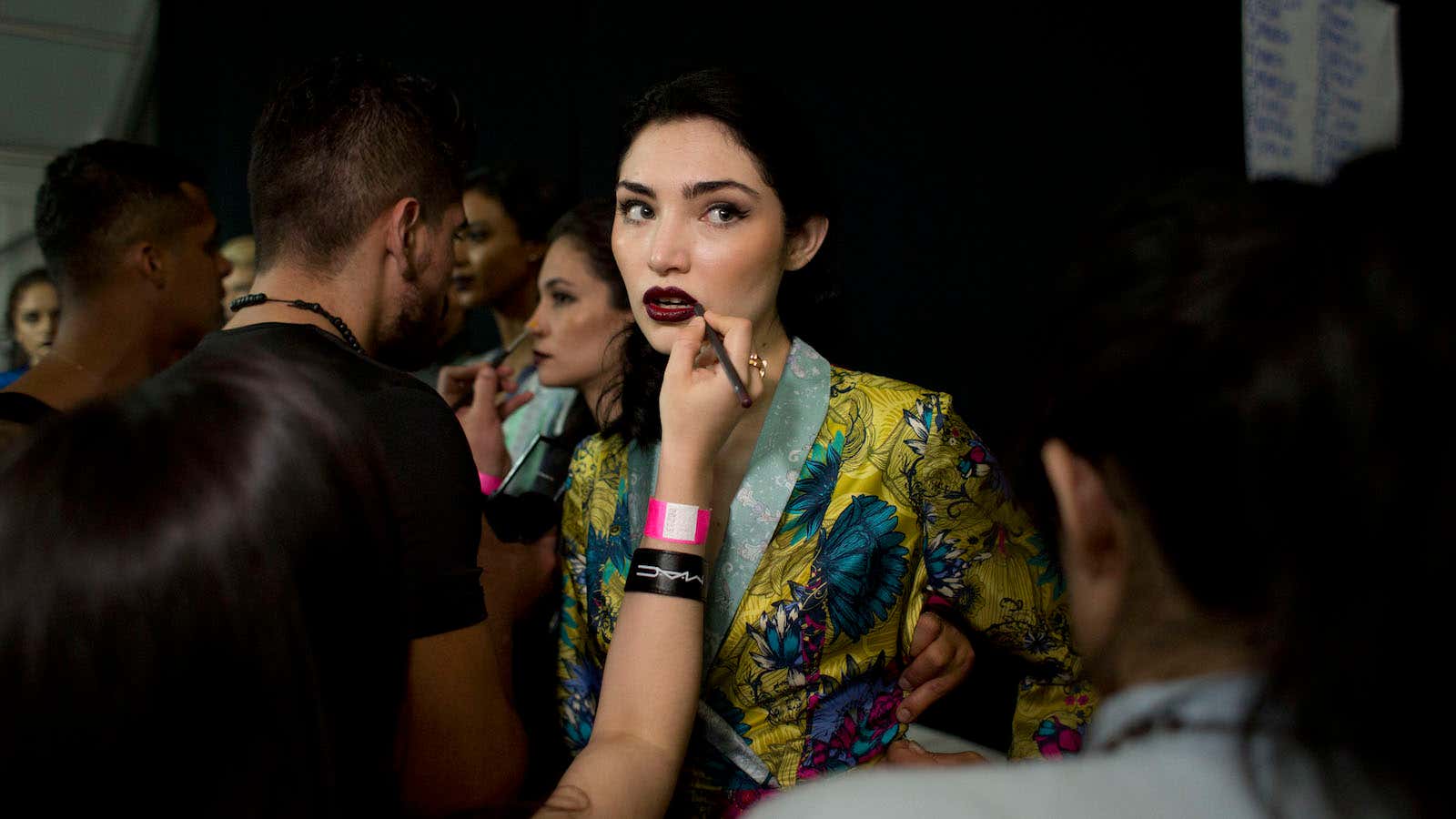The $400 billion-plus global cosmetics business has mastered the art of delivering two conflicting messages at once: “You’re imperfect, and you need me” and “You’re already gorgeous, and I’m merely the wind beneath your gorgeous winged eyeliner.” The industry has repeatedly proven that it can survive trends in fashion and feminist politics, and sell anything, including overpriced sheet masks, and makeup that makes skin makeup-ready.
For all of these reasons, makeup is taken seriously as a business. But are its customers, still largely women, taken seriously in makeup?
To answer a version of that question, psychology researchers at Abertay University in Scotland conducted an intriguing study that was recently published in the journal Perception. They recruited more than 150 young men and women and asked them to share their first-impression evaluations of computer-generated faces which were either wearing heavy makeup, a moderate amount of it, or none.
“Previous work had found that makeup for a social night out made women look more dominant to other women and more prestigious to men,” says Christopher Watkins, a psychology professor at the school and co-author of the study. One of his students wanted to test whether the look had the same positive effect on perceptions of leadership ability. They found it did not.




Instead, when participants viewed a face in heavy makeup they were less likely to see that individual as a strong “leader.”
When the faces were modified with a makeup level scaled back to 50%, however, the data suggested that makeup sometimes had a positive effect. But these results were not more significant than chance, which the authors took as a sign that more research into moderate makeup levels was needed.
The study, the first of its kind to Watkins’ knowledge, involved computer-generated images. The faces were composed using photographs of models who were either of caucasian or African ancestry. In one case, a trained makeup artist who was also a co-author of the study created the evening look. In a second experiment, the models applied their own cosmetics. The effects were the same: Participants of any gender and race were less likely to see the faces with more obvious artificial coloration as the faces of leaders.
Watkins and his team did not study the thinking that led to these decisions, so more experimenting would also be required to determine whether heavy makeup tends to shout “less competent,” or “too superficial” or whatever it is that makes someone discount a person’s leadership potential because they have too much makeup on.
Indeed, in many ways, this is a limited study. Its findings may be related to the types of faces selected as canvases, and its results might be affected by contexts (work environments) and across cultures.
A leader’s level of seniority also might affect reactions to makeup. A few years ago, Watkins co-authored a paper on attractiveness at different managerial levels of an organization. He found that people were likely to allocate more pay to attractive faces at lower levels of management, say in customer-facing retail jobs. “The effect was much weaker as you went up to higher level jobs,” Watkins says.
In lab experiments, researchers also have found that people deemed to be attractive aren’t always offered jobs over their less-attractive competitors, as is commonly believed. As Quartz’s Leah Fessler has reported, a study from London Business School found “people don’t just hire attractive people because they consciously or unconsciously prefer them—rather, when hiring, people actively consider what roles the physically attractive candidates would themselves prefer, and then base the hiring decision on that perceived preference.” So if a job is deemed “low-status,” it’s less likely that we’ll match it with someone considered attractive.
Watkins emphasizes that his intention is not to make any value call on makeup habits. Although this line of research may one day feel relevant when you select a photo for your professional bio page, this isn’t about attending to the corporate gaze, so to speak.
That’s reassuring. As women in leadership roles have reported, they’re already being judged more harshly than men in the same jobs for everything from how sensitive or assertive they are, to the way they dress, and any bad decisions they make. We don’t need to add lipstick intensity to the list.
This story is part of How We’ll Win, a project exploring the fight for gender equality at work. Read more stories here.
